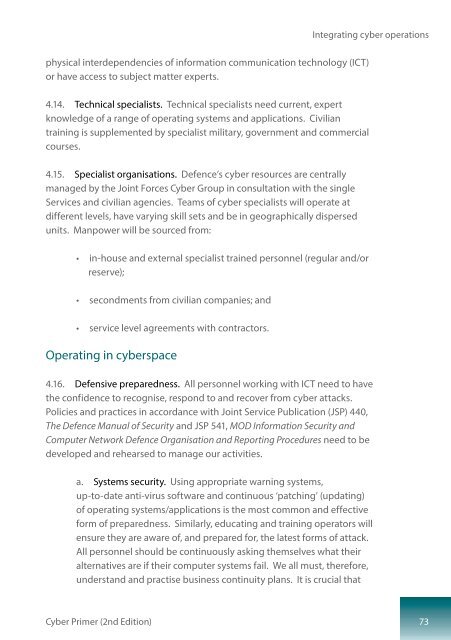Cyber Primer
AEWhbF
AEWhbF
You also want an ePaper? Increase the reach of your titles
YUMPU automatically turns print PDFs into web optimized ePapers that Google loves.
Integrating cyber operations<br />
physical interdependencies of information communication technology (ICT)<br />
or have access to subject matter experts.<br />
4.14. Technical specialists. Technical specialists need current, expert<br />
knowledge of a range of operating systems and applications. Civilian<br />
training is supplemented by specialist military, government and commercial<br />
courses.<br />
4.15. Specialist organisations. Defence’s cyber resources are centrally<br />
managed by the Joint Forces <strong>Cyber</strong> Group in consultation with the single<br />
Services and civilian agencies. Teams of cyber specialists will operate at<br />
different levels, have varying skill sets and be in geographically dispersed<br />
units. Manpower will be sourced from:<br />
• in-house and external specialist trained personnel (regular and/or<br />
reserve);<br />
• secondments from civilian companies; and<br />
• service level agreements with contractors.<br />
Operating in cyberspace<br />
4.16. Defensive preparedness. All personnel working with ICT need to have<br />
the confidence to recognise, respond to and recover from cyber attacks.<br />
Policies and practices in accordance with Joint Service Publication (JSP) 440,<br />
The Defence Manual of Security and JSP 541, MOD Information Security and<br />
Computer Network Defence Organisation and Reporting Procedures need to be<br />
developed and rehearsed to manage our activities.<br />
a. Systems security. Using appropriate warning systems,<br />
up-to-date anti-virus software and continuous ‘patching’ (updating)<br />
of operating systems/applications is the most common and effective<br />
form of preparedness. Similarly, educating and training operators will<br />
ensure they are aware of, and prepared for, the latest forms of attack.<br />
All personnel should be continuously asking themselves what their<br />
alternatives are if their computer systems fail. We all must, therefore,<br />
understand and practise business continuity plans. It is crucial that<br />
<strong>Cyber</strong> <strong>Primer</strong> (2nd Edition) 73


